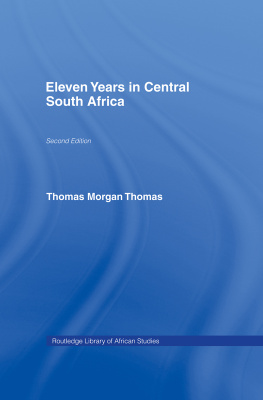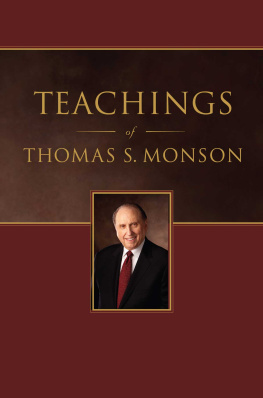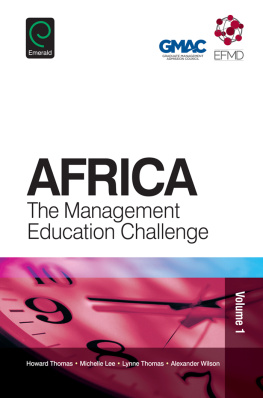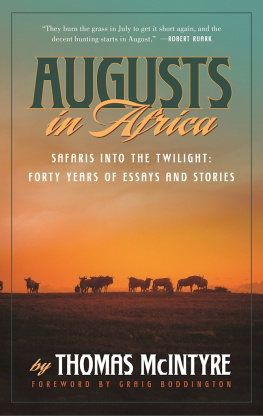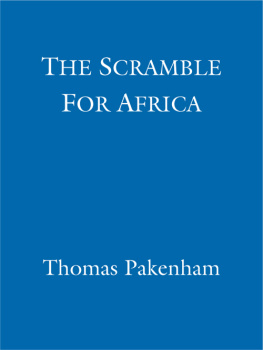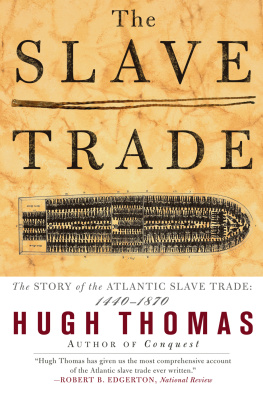ROUTLEDGE LIBRARY OF AFRICAN STUDIES
MISSIONARY RESEARCHES
AND TRAVELS
No. 23
General Editor: ROBERT I. ROTBERG
Associate Professor, Department of Political Science,
Massachusetts Institute of Technology
ELEVEN YEARS IN
CENTRAL SOUTH AFRICA
Published by
Routledge
This edition published by Routledge
2 Park Square, Milton Park, Abingdon, Oxon, OX14 4RN
711 Third Avenue, New York, NY 10017
Routledge is an imprint of the Taylor & Francis Group, an informa business
New introduction Copyright 1971 Richard Brown
First edition 1872
Second edition 1971
Transferred to Digital Printing 2007
ISBN: 978-0-714-61880-7 (hbk)
ISBN: 978-1-136-25709-4 (ebk)
Publishers Note
The publisher has gone to great lengths to ensure the quality of this
reprint but points out that some imperfections in the original
may be apparent
General Editors Preface
In the literature of pre-conquest Rhodesia, Thomas Morgan Thomass Eleven Years in Central South Africa stands out. No other book of the period contains such a wealth of valuable ethnological and political material about the Ndebele under Mzilikazi and Lobengula in the difficult years before the coming of Cecil Rhodess British South Africa Company juggernaut.
Richard Brown, Lecturer in African history at the University of Sussex, intimately knows the period to which Thomass work is relevant. He sets both the career of Thomas and his fellow prosely-tisers of the London Missionary Society in the context of their times and, additionally, discusses Thomass bitter controversy with his colleagues and the directors of the society. Possessing the best local connections, linguistic abilities, and practical accomplishments of the missionaries, Thomas was accused of being too close to the Ndebele and, no matter how astonishing it now seems, thereby of derogating his and their evangelical endeavour. The republication of Eleven Years provides a fitting commentary on that accusation.
R.I.R.
September 1970
Introduction to the
Second Edition
Thomas Morgan Thomas was once described by the wife of a fellow-missionary as a Welsh imitator of Livingstone.
The broad setting for Thomass arduous life in Matabeleland arose from the conjunction of two major historical movements, one the product of developments in British society, the other internal to Africa. Within Britain, the remarkable upsurge of Protestant missionary activity in the late eighteenth century was part of the much wider birth of a confident, outward-looking industrial society. Christian missions were collectively but one aspect of a many-sided overseas expansion. In all branches of this expansion, men from the depressed periphery of British society in Scotland and in Wales played a particularly prominent part. In a Britain still extremely status-conscious, an overseas career provided chances of social advancement denied at home, a fact discovered by the many British explorers of Africa who came from the Celtic fringe. Similarly, the overseas mission, apart from its undeniable religious motivations, offered a career open to all talents. The two famous Scots, Robert Moffat and David Livingstone, whose writings were to inspire Thomas, both overcame their lowly social origins by way of the missionary call.
Like his two heroes, Thomas grew up in extremely harsh circumstances. He was the son of a poor tenant farmer, Evan Thomas, and was born at Bridgend, South Wales, on 13th March 1828. At the early age of seven he was thrown on his own resources and forced to support himself as an agricultural labourer. During this time, he demonstrated something of his later character and tenacity of purpose by saving sufficient money to begin a formal education at the age of twenty. After learning English and completing an elementary education, he entered Brecon College to study for the ministry. It was here that he encountered the missionary writings of Moffat and Livingstone and decided to follow their example.
Within Africa, it was the extensive socio-political changes associated with the rise of the Zulu empire in the Natal coastal plains between 1810 and 1820 which provided the background to Thomass missionary career among the Ndebele. The Ndebele kingdom, whose influence was to be decisive over much of south-central Africa between the Limpopo and Zambezi rivers in the half-century before the scramble for Africa by the European powers, originated in a small breakaway from Shakas Zulu empire in 1823.
For some fifteen years Mzilikazis expanding state was located in various parts of the Transvaal high veldt, and it was only between 1838 and 1840, following major conflicts with Zulu armies and with the Voortrekkers escaping from British rule at the Cape, that it finally came to rest in Matabeleland. Here, in the tsetse-free and open cattle country abutting the Matopo mountains, the organisation of Ndebele society, as Thomas makes clear, continued to be highly militarised. Although Ndebele settlement was concentrated in a relatively restricted area within some fifty miles of modern Bulawayo, their political and military strength was felt much more widely afield. It was their predatory raids on other peoples which helped to precipitate the attempt to promote a Christian mission on such unpromising ground.
One of the earliest manifestations of the new interest in overseas evangelism had been the foundation of the inter-denominational London Missionary Society in 1795. Much of its early activity was centred on the Cape Colony where its missionaries played an important role in the attempts to improve the status of coloured people in the face of bitter Boer hostility. In addition, the L.M.S. was soon working beyond the boundaries of the Colony, most notably at Kuruman among the Tswana (Bechuana). The mission at Kuruman became celebrated through the work of Robert Moffat, who had established it as the most northerly outpost in 1824, and also through its association with the early career of David Livingstone. It was largely due to these two men that the Ndebele and missionary expansionist movements began to interact, but it was the Ndebele king himself who initiated the first contacts.
While still in the Transvaal region, Mzilikazi was subject to the insecurities of the Mfecane and became anxious to obtain firearms and a reliable connection with white men.
If Moffat was the agency through which the missionary movement reached out to embrace so remote a part of the African continent as Matabeleland in 1859, the immediate stimulus stemmed from Livingstones restless interpretation of the missionary calling. Livingstone, who married Moffats eldest daughter, was not content to remain in his father-in-laws extensive shadow and was soon voicing his impatience at what he regarded as the unduly slow expansion of missionary frontiers. It was an attitude which, combined with his geographical curiosity and his temperamental difficulty in cooperating with his fellow missionaries (traits he shared with Thomas), led to his trans-continental journey of 185356 and to his ultimate break with the L.M.S. At the same time, the fame and influence which the journey gave to Livingstone in Britain gave an impetus to missionary activity only matched by the effect of his dramatic death nearly twenty years later.


